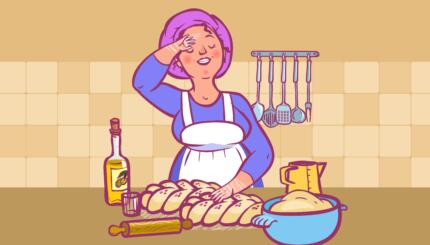“Start working on this great work of art, called your own existence”– AJ Heschel
A Life well lived is an art: with guides on perspective, scale, composition, ect.
The great artists know when to break the very rules they follow, it’s the breaking of pattern and expectation that creates interest, wonder, and awe.
Such is life.
So what is religion? Specifically, what is Judaism? What is Halacha, Jewish law, “THE way,” “THE path?” To be sure, there is more than one set of rules to follow in order to make great art, just as there is truth to be found in more than one religion. Great art borrows from other great art. Similarly, ‘no religion is an island’ (again Heschel); we borrow and share, and are deeply influenced by the religion and culture that surrounds us. Halacha then, is “a set of rules” that gives life structure and meaning.
But we have to remember that rules, patterns, are appreciated more when disrupted, challenged. It is the disruption of pattern that makes us take note of both the new and the expected. Fundamentally, our psyche is trained to take for granted the expected and to pay attention to the unique, the surprising, the break in a pattern. Such is the excitement of new love (as described in a New York Times piece on marriage, “New Love: A Short Shelf Life.” The summary: exciting for 2 years, boring and expected for about 20, with a renewed excitement at empty nest. –I’ll simply disagree for now – there is so much more to blissful married life).
In any artform, including Life, including specifically Jewish life, the better you know the rules, the more masterful the impact in breaking them. An analogy: Consider the power of a well placed single word paragraph.
Crap.
English teachers can’t teach you that.
Consider Spielberg’s girl in the red dress at the end of Shindler’s List. The color adds meaning both to the innocence preserved and to the ominous nature of the otherwise black-and-white film.
In the Bible, the law of primogeniture, the rule that says that the oldest inherits, is constantly overturned: Abraham is not the oldest, Isaac is not the oldest, Jacob is younger than his twin Esau and has to trick and steal to inherit. Even King David, the rightful king of Israel, is the youngest. Why does the Bible so often highlight the breaking of this rule? Because rules gain meaning when the possibility of breaking them also exists.
It is said that there was once a very pious Jew who when he would read the verse, “…and do not be seduced by your heart or led astray by your eyes,” he would start crying (Numbers 15:39, the third paragraph of the Shema prayer said twice daily).
“Why do you cry,” he was asked?
“Because,” the pious man replied, “my entire life I have done exactly what the letter of the law has required of me, and in so doing, I’ve never had the opportunity to fully understand this verse.”
Years ago I chose not to wear my kippa (head covering). I wear it everyday, just about wherever I go. I wear it as a reminder of God, as a symbol of humility, that God is above me, and as an identification with the Jewish people. Driving a U-Haul across the country almost twenty years ago, I pulled into a truck stop in Oklahoma. I decided to put my kippa in my pocket. I wondered to myself why I was doing that? Am I not proud of being Jewish? So, I was wondering about this as I approach the register inside the station. The man in front of me was wearing jeans and a flannel shirt – just like me! I’ve always wanted to be a long-haul trucker. I had this great sense of authenticity. I fit in – until he turned around. His shirt was open and revealed a giant swastika that covered the entirety of his barrel chest. I became very conscious of the kippa in my pocket. All of its symbolism was somehow all the more powerful in my pocket than it is day-to-day in my life in Los Angeles, or New York, where I was headed.
“Profane one Shabbat so that one can keep many Shabbatot” -Yoma 85B
It seems that our religion, so often associated with the strictures of laws, might be better described as teaching the artful breaking of laws.
I content that there is an essential paradox at the heart of a meaningful life: Breaking with tradition and law, has the very real possibility of strengthening tradition and the power of the very rules being broken.
Shabbat
Pronounced: shuh-BAHT or shah-BAHT, Origin: Hebrew, the Sabbath, from sundown Friday to sundown Saturday.
Shema
Pronounced: shuh-MAH or SHMAH, Alternate Spellings: Sh'ma, Shma, Origin: Hebrew, the central prayer of Judaism, proclaiming God is one.



